-
 Bitcoin
Bitcoin $114400
1.32% -
 Ethereum
Ethereum $3499
2.20% -
 XRP
XRP $2.922
4.26% -
 Tether USDt
Tether USDt $0.0000
0.03% -
 BNB
BNB $752.6
1.53% -
 Solana
Solana $161.8
1.64% -
 USDC
USDC $0.9999
0.01% -
 TRON
TRON $0.3267
1.32% -
 Dogecoin
Dogecoin $0.1991
3.02% -
 Cardano
Cardano $0.7251
3.29% -
 Hyperliquid
Hyperliquid $38.32
3.36% -
 Stellar
Stellar $0.3972
7.58% -
 Sui
Sui $3.437
2.74% -
 Chainlink
Chainlink $16.29
3.65% -
 Bitcoin Cash
Bitcoin Cash $545.3
3.70% -
 Hedera
Hedera $0.2482
7.49% -
 Ethena USDe
Ethena USDe $1.001
0.03% -
 Avalanche
Avalanche $21.40
2.02% -
 Toncoin
Toncoin $3.579
1.56% -
 Litecoin
Litecoin $109.3
2.20% -
 UNUS SED LEO
UNUS SED LEO $8.951
-0.18% -
 Shiba Inu
Shiba Inu $0.00001220
2.75% -
 Polkadot
Polkadot $3.613
2.99% -
 Uniswap
Uniswap $9.173
3.78% -
 Monero
Monero $302.6
2.62% -
 Dai
Dai $0.0000
0.00% -
 Bitget Token
Bitget Token $4.320
1.52% -
 Pepe
Pepe $0.00001048
3.40% -
 Cronos
Cronos $0.1314
4.33% -
 Aave
Aave $259.4
3.54%
How does the tax policy of the NFT market affect the market?
NFT sales are taxed as capital gains, with short-term gains taxed as income and long-term gains at a lower rate, impacting market liquidity and participation.
Apr 03, 2025 at 08:50 am
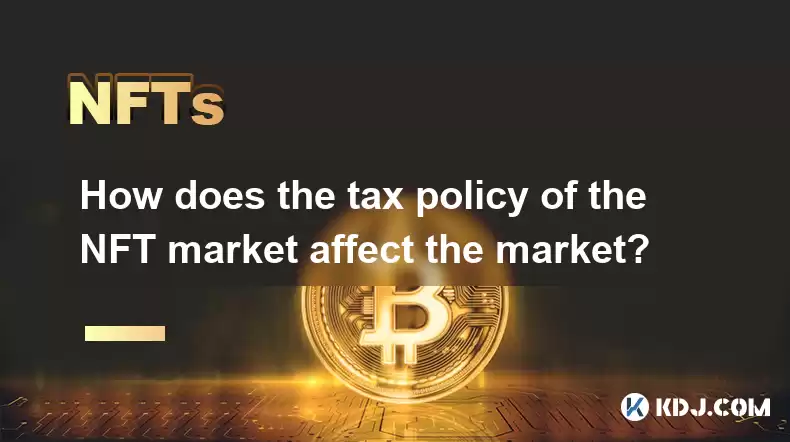
The NFT market, short for Non-Fungible Token market, has experienced significant growth and popularity in recent years. As with any burgeoning market, the tax policies surrounding NFTs have become a topic of interest and concern for investors, creators, and traders alike. Understanding how these tax policies affect the NFT market is crucial for anyone involved in this space. In this article, we will delve into the various aspects of tax policies related to NFTs and their impact on the market.
Taxation of NFT Sales
NFTs are typically treated as property for tax purposes, which means that any gains from selling an NFT are subject to capital gains tax. The tax rate depends on whether the gain is considered short-term or long-term. If an NFT is held for less than a year before being sold, the gain is taxed as ordinary income. Conversely, if the NFT is held for more than a year, the gain is taxed at the long-term capital gains rate, which is generally lower.
- If you buy an NFT for $1,000 and sell it for $2,000 within six months, the $1,000 profit is taxed as ordinary income.
- If you hold the same NFT for over a year and then sell it for $2,000, the $1,000 profit is taxed at the long-term capital gains rate.
Taxation of NFT Creation
Creators of NFTs may also face tax implications. When an artist or creator mints an NFT and sells it, the income from the sale is considered taxable. This income is typically reported as self-employment income, which means the creator may be subject to self-employment taxes in addition to income tax.
- An artist mints an NFT and sells it for $5,000. This $5,000 is considered self-employment income and is subject to income tax and self-employment tax.
Impact on Market Liquidity
Tax policies can significantly affect market liquidity in the NFT market. High tax rates on short-term gains might discourage frequent trading, leading to reduced liquidity. Conversely, favorable tax treatments for long-term holdings might encourage investors to hold onto their NFTs longer, potentially stabilizing the market but also reducing the volume of transactions.
- High short-term capital gains taxes might lead to fewer trades, as investors seek to avoid the higher tax rates.
- Favorable long-term capital gains rates might encourage investors to hold their NFTs longer, leading to a more stable but less liquid market.
Impact on Market Participation
The complexity and potential burden of tax policies can also affect who participates in the NFT market. For instance, high-income earners might be more willing to navigate the complexities of NFT taxation, while others might find the tax implications too burdensome and opt out of the market.
- High-income earners might be more inclined to invest in NFTs due to their ability to handle complex tax situations.
- Lower-income individuals might be deterred from participating due to the potential tax burden.
Impact on NFT Valuation
Tax policies can influence how NFTs are valued. If investors anticipate high tax liabilities upon selling their NFTs, they might be less willing to pay high prices, which could depress NFT valuations. Conversely, if tax policies are favorable, investors might be more willing to pay higher prices, driving up valuations.
- High anticipated tax liabilities might lead to lower NFT valuations as investors account for the potential tax burden.
- Favorable tax policies might lead to higher NFT valuations as investors feel more confident in their after-tax returns.
International Tax Considerations
The NFT market is global, and international tax considerations can further complicate the tax landscape. Different countries have different tax treatments for NFTs, which can affect cross-border transactions and the overall market dynamics.
- An investor in the U.S. selling an NFT to a buyer in Europe might face different tax implications than if the buyer were in the U.S.
- Countries with more favorable tax treatments for NFTs might attract more market participants, influencing global market dynamics.
Tax Reporting and Compliance
The complexity of NFT taxation can also impact compliance and reporting. Investors and creators must keep detailed records of their transactions to accurately report their taxes. This can be a significant burden, especially for those who engage in frequent trading.
- Keeping detailed records of purchase and sale dates, as well as the cost basis and sale price of each NFT, is crucial for accurate tax reporting.
- The complexity of tax reporting might deter some individuals from participating in the NFT market.
Potential for Tax Evasion
The decentralized nature of the NFT market and the use of cryptocurrencies for transactions can create opportunities for tax evasion. This can undermine the integrity of the market and lead to regulatory scrutiny.
- Using cryptocurrencies to buy and sell NFTs can make it easier to hide transactions from tax authorities.
- Increased regulatory scrutiny might lead to stricter reporting requirements and enforcement, affecting market dynamics.
Impact on Market Innovation
Tax policies can also influence innovation within the NFT market. High tax burdens might discourage creators from experimenting with new types of NFTs, while favorable tax treatments might encourage more innovation.
- High tax rates might deter creators from experimenting with new NFT projects due to the potential tax burden.
- Favorable tax treatments might encourage more innovation as creators feel more confident in their after-tax returns.
Impact on Market Sentiment
Finally, tax policies can influence overall market sentiment. Positive tax policies can boost confidence in the market, while negative tax policies can lead to uncertainty and reduced participation.
- Favorable tax policies might boost investor confidence and lead to increased market participation.
- Negative tax policies might lead to uncertainty and reduced market participation.
Common Questions Related to NFT Market Tax Policies
Q: How are NFTs taxed in the United States?
A: In the United States, NFTs are generally treated as property for tax purposes. Gains from selling an NFT are subject to capital gains tax, with short-term gains taxed as ordinary income and long-term gains taxed at a lower rate. Creators of NFTs report income from sales as self-employment income, which is subject to income tax and self-employment tax.
Q: Can tax policies affect the liquidity of the NFT market?
A: Yes, tax policies can significantly affect market liquidity. High tax rates on short-term gains might discourage frequent trading, leading to reduced liquidity. Conversely, favorable tax treatments for long-term holdings might encourage investors to hold onto their NFTs longer, potentially stabilizing the market but also reducing the volume of transactions.
Q: How do international tax considerations impact the NFT market?
A: The NFT market is global, and different countries have different tax treatments for NFTs. This can affect cross-border transactions and overall market dynamics. Countries with more favorable tax treatments might attract more market participants, influencing global market dynamics.
Q: What are the compliance and reporting requirements for NFT transactions?
A: Investors and creators must keep detailed records of their NFT transactions to accurately report their taxes. This includes purchase and sale dates, cost basis, and sale price. The complexity of tax reporting can be a significant burden, especially for those who engage in frequent trading.
Q: How can tax policies influence innovation in the NFT market?
A: High tax burdens might discourage creators from experimenting with new types of NFTs, while favorable tax treatments might encourage more innovation. Creators are more likely to innovate when they feel confident in their after-tax returns.
Q: Can tax policies affect the overall sentiment in the NFT market?
A: Yes, tax policies can influence overall market sentiment. Positive tax policies can boost confidence in the market, leading to increased participation. Conversely, negative tax policies can lead to uncertainty and reduced market participation.
Disclaimer:info@kdj.com
The information provided is not trading advice. kdj.com does not assume any responsibility for any investments made based on the information provided in this article. Cryptocurrencies are highly volatile and it is highly recommended that you invest with caution after thorough research!
If you believe that the content used on this website infringes your copyright, please contact us immediately (info@kdj.com) and we will delete it promptly.
- Cryptocurrency, Altcoins, and Profit Potential: Navigating the Wild West
- 2025-08-04 14:50:11
- Blue Gold & Crypto: Investing Disruption in Precious Metals
- 2025-08-04 14:30:11
- Japan, Metaplanet, and Bitcoin Acquisition: A New Era of Corporate Treasury?
- 2025-08-04 14:30:11
- Coinbase's Buy Rating & Bitcoin's Bold Future: A Canaccord Genuity Perspective
- 2025-08-04 14:50:11
- Coinbase's Buy Rating Maintained by Rosenblatt Securities: A Deep Dive
- 2025-08-04 14:55:11
- Cryptos, Strategic Choices, High Returns: Navigating the Meme Coin Mania
- 2025-08-04 14:55:11
Related knowledge
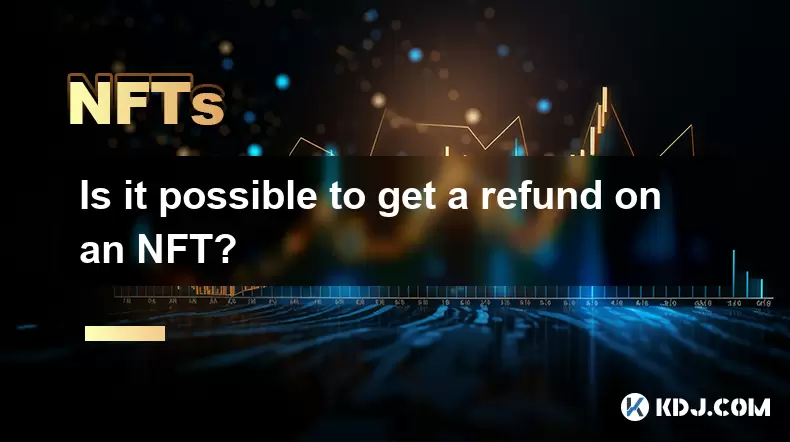
Is it possible to get a refund on an NFT?
Jul 21,2025 at 08:35pm
Understanding NFT Transactions and RefundsWhen you purchase an NFT (Non-Fungible Token), the transaction is typically recorded on a blockchain, making...
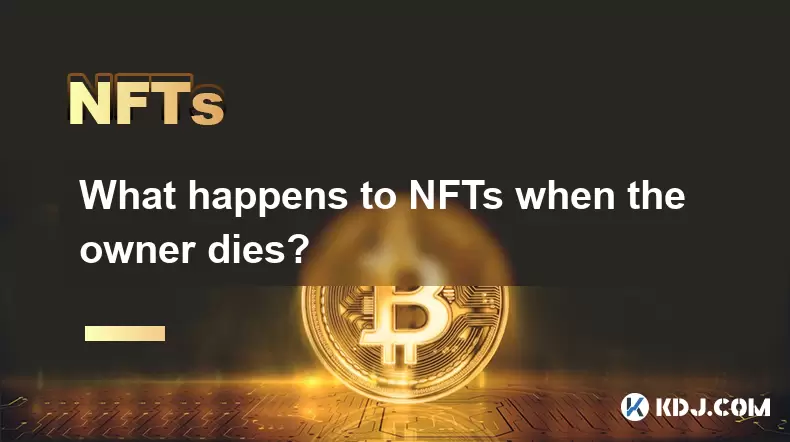
What happens to NFTs when the owner dies?
Jul 22,2025 at 02:43pm
Legal Ownership and Digital AssetsWhen an individual owns NFTs, the question of what happens to these assets upon their death is a pressing one. NFTs ...
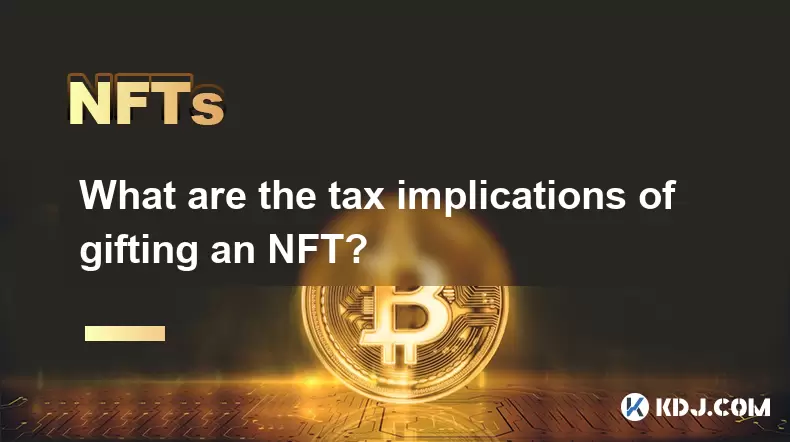
What are the tax implications of gifting an NFT?
Jul 19,2025 at 04:21am
Understanding the Basics of NFT GiftingGifting a Non-Fungible Token (NFT) involves transferring ownership from one individual to another without recei...
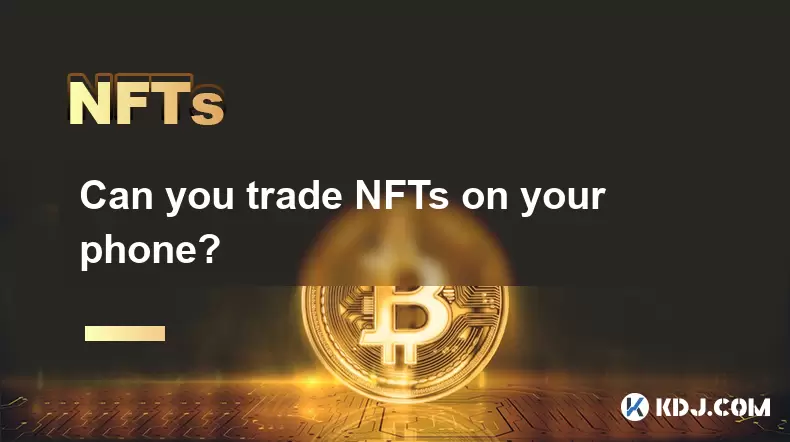
Can you trade NFTs on your phone?
Jul 18,2025 at 04:29am
Trading NFTs on Mobile DevicesYes, you can trade NFTs on your phone, and the process has become increasingly streamlined thanks to a variety of mobile...
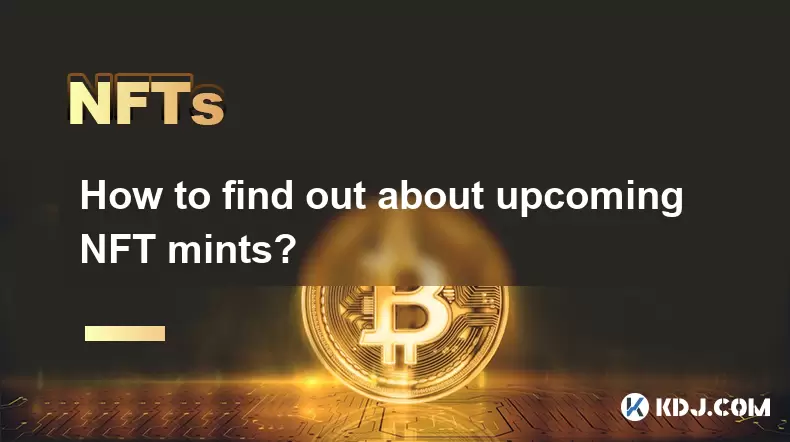
How to find out about upcoming NFT mints?
Jul 18,2025 at 11:50am
Exploring NFT Minting OpportunitiesUnderstanding the landscape of upcoming NFT mints is crucial for collectors, investors, and creators who wish to st...
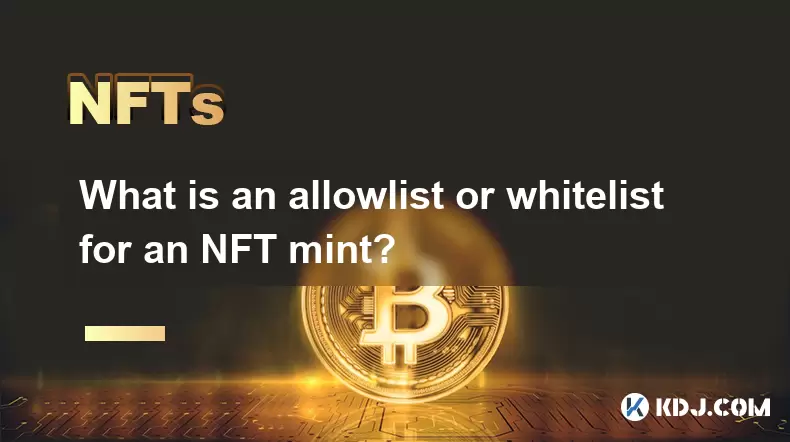
What is an allowlist or whitelist for an NFT mint?
Jul 20,2025 at 07:14pm
Understanding the Concept of an Allowlist for NFT MintingAn allowlist, also commonly referred to as a whitelist, is a mechanism used in the NFT mintin...

Is it possible to get a refund on an NFT?
Jul 21,2025 at 08:35pm
Understanding NFT Transactions and RefundsWhen you purchase an NFT (Non-Fungible Token), the transaction is typically recorded on a blockchain, making...

What happens to NFTs when the owner dies?
Jul 22,2025 at 02:43pm
Legal Ownership and Digital AssetsWhen an individual owns NFTs, the question of what happens to these assets upon their death is a pressing one. NFTs ...

What are the tax implications of gifting an NFT?
Jul 19,2025 at 04:21am
Understanding the Basics of NFT GiftingGifting a Non-Fungible Token (NFT) involves transferring ownership from one individual to another without recei...

Can you trade NFTs on your phone?
Jul 18,2025 at 04:29am
Trading NFTs on Mobile DevicesYes, you can trade NFTs on your phone, and the process has become increasingly streamlined thanks to a variety of mobile...

How to find out about upcoming NFT mints?
Jul 18,2025 at 11:50am
Exploring NFT Minting OpportunitiesUnderstanding the landscape of upcoming NFT mints is crucial for collectors, investors, and creators who wish to st...

What is an allowlist or whitelist for an NFT mint?
Jul 20,2025 at 07:14pm
Understanding the Concept of an Allowlist for NFT MintingAn allowlist, also commonly referred to as a whitelist, is a mechanism used in the NFT mintin...
See all articles

























































































